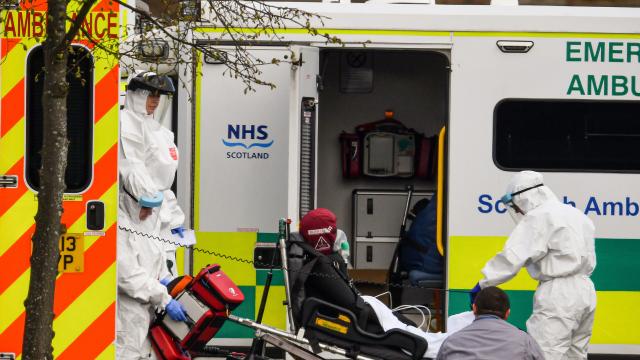UK Prime Minister Boris Johnson made an unsettling announcement on Friday about B 1.1.7, the variant of the coronavirus first found in the UK last fall that’s become widespread in the country and elsewhere. According to data newly analysed by UK scientists, B 1.1.7 is not only more transmissible than earlier strains, but it may also be more likely to cause death. Though these conclusions are still preliminary, they do appear to be worth taking seriously.
The announcement was based on data assessed by the UK’s New and Emerging Respiratory Virus Threats Advisory Group, or NERVTAG, an independent group of scientists that has helped shape the country’s pandemic response. Last December, their work studying B 1.1.7 solidified the consensus that the variant was more transmissible than previously circulating strains. Initially, their analysis found no evidence that B 1.1.7 was causing more severe illness or death in the population than before. But that’s no longer the case.
According to their new paper released Friday, there are now several independent analyses of the case data collected in recent weeks pointing to the same trend — an uptick in people dying from B 1.1.7 compared to people infected with other strains of the virus. Though the exact numbers differ between groups, they suggest that B 1.1.7 is about 30% more likely to cause death than previous strains. Note that, while a 30% increase sounds huge, the overall mortality rate would still be somewhere around 1%.
“This is of course quite concerning, given the speed at which this variant has overtaken circulating strains across different regions and our inability to control general transmission in many parts of the world,” Jason Kindrachuk, a virologist at the University of Manitoba in Canada who wasn’t involved in the new research, told Gizmodo in an email.
As the authors of the new paper emphasise, there are limitations to their findings. The data that UK scientists are using to study the coronavirus only covers a small portion of total cases and deaths in the country on any given day. Some sources of data, like the outcomes of hospitalised patients, also take more time to collect than others. This may explain why hospitalisation data specifically doesn’t seem to show that B.1.1.7 is deadlier — the data might not be up to date enough to find that pattern yet. It’s also possible that B.1.1.7 is putting more people in the hospital but not necessarily changing a hospitalised patient’s odds of survival.
One possible factor that could indirectly explain why B.1.1.7 seems deadlier — hospitals being overwhelmed with more cases caused by a more transmissible variant — doesn’t appear to be playing a major role, however. One analysis, by The London School of Hygiene & Tropical Medicine, accounted for “hospital pressure covariates” like the number of available hospital beds for patients on a ventilator but found no substantial change in their conclusions. The increase in death rates was consistent across different age groups, too, further suggesting a real higher risk of mortality from B.1.1.7 alone.
[referenced id=”1665691″ url=”https://gizmodo.com.au/2021/01/south-african-coronavirus-variant-may-dodge-existing-immunity-in-some-people/” thumb=”https://gizmodo.com.au/wp-content/uploads/2021/01/20/ncj45jlrru3h8ihlctpv-300×169.jpg” title=”South African Coronavirus Variant May Dodge Existing Immunity in Some People” excerpt=”Experts are becoming increasingly worried that at least some variants of the coronavirus will pose an added challenge to limiting the spread of covid-19 through vaccination. Recent data announced over the weekend suggests a variant first found in South Africa can escape detection from antibodies in some people who had…”]
Several countries are now worried about the emergence of B.1.1.7 and other, similar variants. Should B.1.1.7 take hold outside the UK, as some experts have warned, it would certainly threaten to unravel the recent decline in cases and hospitalizations seen recently in some countries.
“My immediate thoughts, of course, went to the toll of this disease on our long-term care facility residents in Canada and what this variant could mean for an already precarious situation,” Kindrachuk said. Canada, like the U.S., is newly experiencing a decline in cases and hospitalizations. But outbreaks of variants similar to B 1.1.7 have already been found in local nursing homes.
More work has to be done to confirm these findings. But no matter the conclusions, it remains absolutely pivotal to do what we can to reduce the spread of the pandemic as quickly as possible — including wearing masks, avoiding indoor socialising when possible, and getting vaccinated when you become eligible.
